How to Build a RESTful API with Deno, Oak, and FerretDB
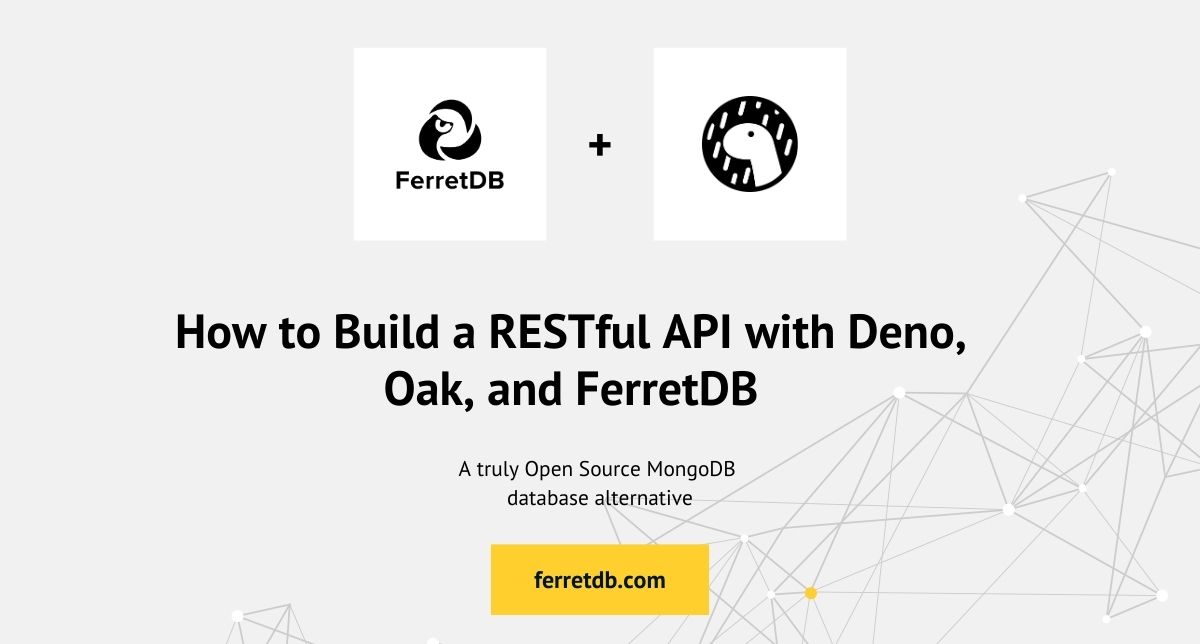
What if you could overcome Node.js's limitations and build a RESTful API with enhanced security and simplicity?
Node.js has been the most popular server-side Javascript runtime environment for quite some time now. For many developers, it has become a crucial part of the popularized web development stacks such as MEAN (MongoDB, Express, Angular, and Node.js) and MERN (MongoDB, Express, React, and Node.js).
However, Node.js is not without its limitations – a centralized module system, no built-in support for Typescript, complex dependency management, and poor security.
To address these issues, the creators of Node.js developed Deno. It comes with built-in TypeScript support, a more secure runtime that requires explicit permission to access files, networks, and environments, and a simplified module system that uses URL imports instead of centralized packages.
In this blog post, we'll guide you through setting up a RESTful API using Deno, Oak, and FerretDB for data storage.
Deno, Oak, and FerretDB: A new alternative stack?
Unlike the typical Node.js-based stacks, Deno, Oak, and FerretDB together offer a modern alternative framework for web development.
Instead of Express, you can use Oak – a middleware framework built specifically for Deno – for building web applications and APIs and can take full advantage of its features and ecosystem without additional configuration.
FerretDB, a truly open source alternative to MongoDB built on Postgres, offers you flexibility and freedom without limiting you in any way – no need to worry about vendor lock-in associated with proprietary solutions.
This combination of Deno, Oak, and FerretDB offers a powerful, secure, and modern framework for building scalable web applications and APIs, which makes it a strong alternative to traditional Node.js-based stacks.
Prerequisites
- FerretDB is installed and running locally: If you don't currently have FerretDB running, follow this quickstart guide to set up an instance.
Install Deno locally
We will start by installing Deno on our local machine. The following command installs Deno on Linux/MacOS:
curl -fsSL https://deno.land/install.sh | sh
After installation, follow the installation and manually add the Deno binary to your system path.
Run deno --version to confirm the installation.
$ deno --version
deno 1.45.5 (release, aarch64-apple-darwin)
v8 12.7.224.13
typescript 5.5.2
Building the application
Let's start by creating a directory for the application. From your terminal, run the following command:
mkdir sample_app && cd sample_app
Set up the dependencies
Unlike Node.js, Deno does not require a package.json or a package manager like npm.
Instead, dependencies are imported directly via URLs.
We can start by creating a file to manage all the dependencies.
Create a deps.ts file that exports the Application and Router classes from the Oak framework, and the MongoClient class from the MongoDB driver for use in other parts of our application.
export { Application, Router } from 'https://deno.land/x/oak@v10.5.1/mod.ts'
export { MongoClient, ObjectId } from 'https://deno.land/x/mongo@v0.32.0/mod.ts'
Set up database connection
Since we are setting up Deno with FerretDB, we should create a database connection for our application.
Create a db.ts file for database connection:
import { MongoClient, ObjectId } from './deps.ts'
const client = new MongoClient()
await client.connect('<FerretDB_connection_URI>')
const db = client.database('library')
export const books = db.collection<BookSchema>('books')
interface BookSchema {
_id?: ObjectId
title: string
author: string
genre: string
}
In the code above, we set up a connection to the FerretDB database using the MongoDB client imported from the deps.ts file.
We also define a BookSchema interface to structure our data.
Ensure to replace <FerretDB_connection_URI> with the connection URI to your FerretDB instance.
Create the main server file
Create an server.ts file for your server:
import { Application, Router } from './deps.ts'
import { books } from './db.ts'
import { ObjectId } from 'https://deno.land/x/mongo@v0.32.0/mod.ts'
const app = new Application()
const router = new Router()
const PORT = 3000
router
.get('/', (context) => {
context.response.body = { message: 'Hello from a Deno API!' }
})
.get('/api/books', async (context) => {
const allBooks = await books.find().toArray()
context.response.body = allBooks
})
.get('/api/books/:id', async (context) => {
const id = context.params.id
if (id) {
const book = await books.findOne({ _id: new ObjectId(id) })
if (book) {
context.response.body = book
} else {
context.response.status = 404
context.response.body = { message: 'Book not found' }
}
} else {
context.response.status = 400
context.response.body = { message: 'Invalid book ID' }
}
})
.post('/api/books', async (context) => {
const body = await context.request.body().value
const insertId = await books.insertOne(body)
context.response.body = { id: insertId }
})
.patch('/api/books/:id', async (context) => {
const id = context.params.id
if (id) {
const body = await context.request.body().value
await books.updateOne({ _id: new ObjectId(id) }, { $set: body })
context.response.body = { message: 'Book updated' }
} else {
context.response.status = 400
context.response.body = { message: 'Invalid book ID' }
}
})
.delete('/api/books/:id', async (context) => {
const id = context.params.id
if (id) {
await books.deleteOne({ _id: new ObjectId(id) })
context.response.body = { message: 'Book deleted' }
} else {
context.response.status = 400
context.response.body = { message: 'Invalid book ID' }
}
})
app.use(router.routes())
app.use(router.allowedMethods())
console.log(`Server running at http://localhost:${PORT}`)
await app.listen({ port: PORT })
Each route is set up with a path and a callback function to handle HTTP requests.
The first route handles GET requests at the root URL ("/"), and then sends a simple JSON message back to the client.
The next route handles GET requests at "/api/books", and fetches all book records from the database and returns them to the client.
For GET requests at "/api/books/:id", we retrieve a specific book by its ObjectId, returning the book if found, or a 404 error if not.
The POST route at "/api/books" reads the request body to insert a new book into the database and returns the new book's ID.
The PATCH route updates the specified book's details if the ID is valid and sends back a confirmation message.
The DELETE route removes the specified book from the database and provides a success response message or an error if the ID is invalid.
6. Run the server
Run the server with the necessary permissions:
deno run --allow-net --allow-read --allow-write index.ts
Once the application is up and running, the endpoint http://localhost:3000/ should be accessible.
We will setup a connection in Postman to test if the Deno server is running and accessible. If it is, you should get this response from the API:
{ "message": "Hello from a Deno API!" }
A screenshot of the endpoint's output in Postman can be seen below.
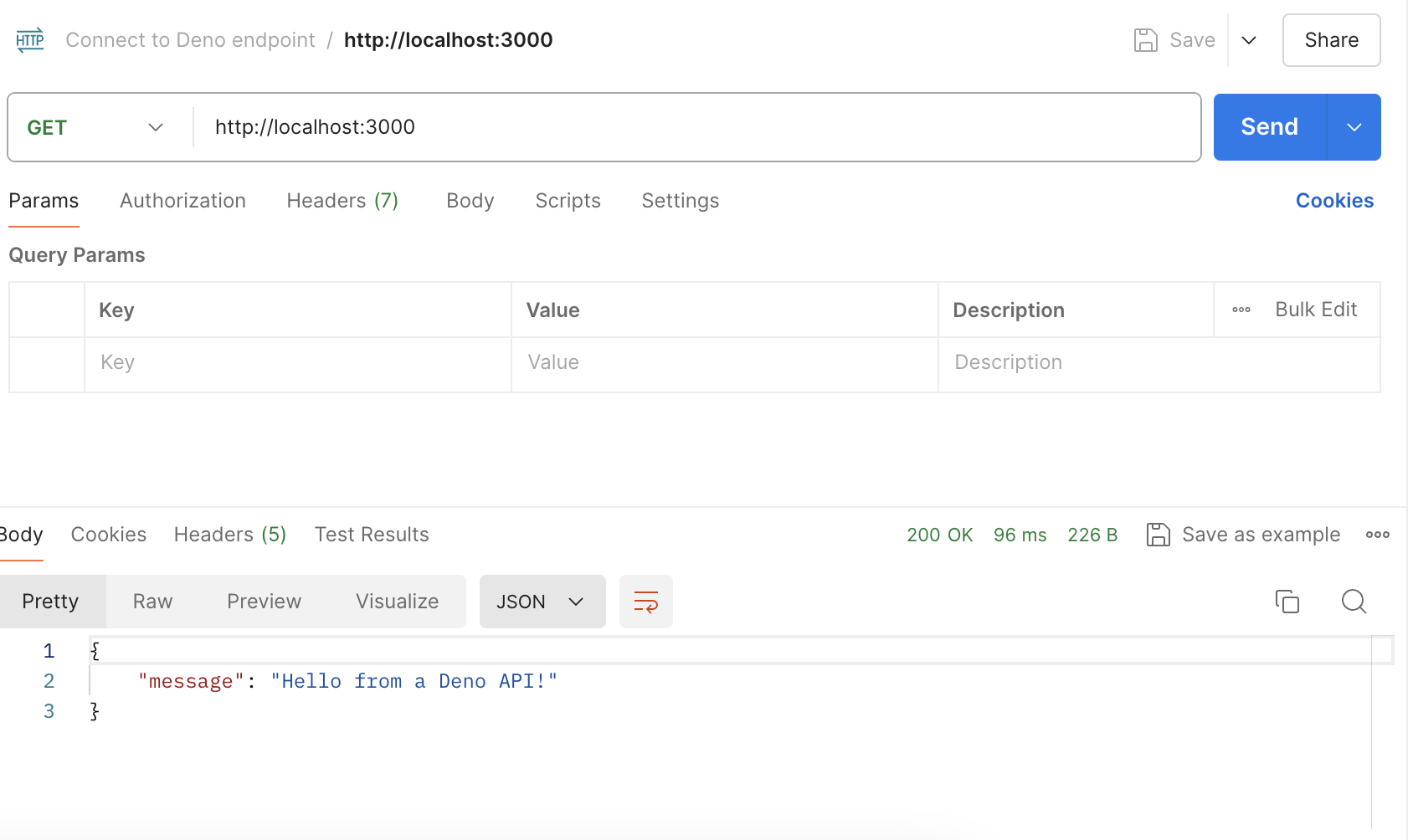
Inserting a new book
Below is an example of a POST request made to the API endpoint http://localhost:3000/api/books.
Here, we are inserting one database record into our FerretDB database.
{
"title": "The Great Gatsby",
"author": "F. Scott Fitzgerald",
"genre": "Classic"
}
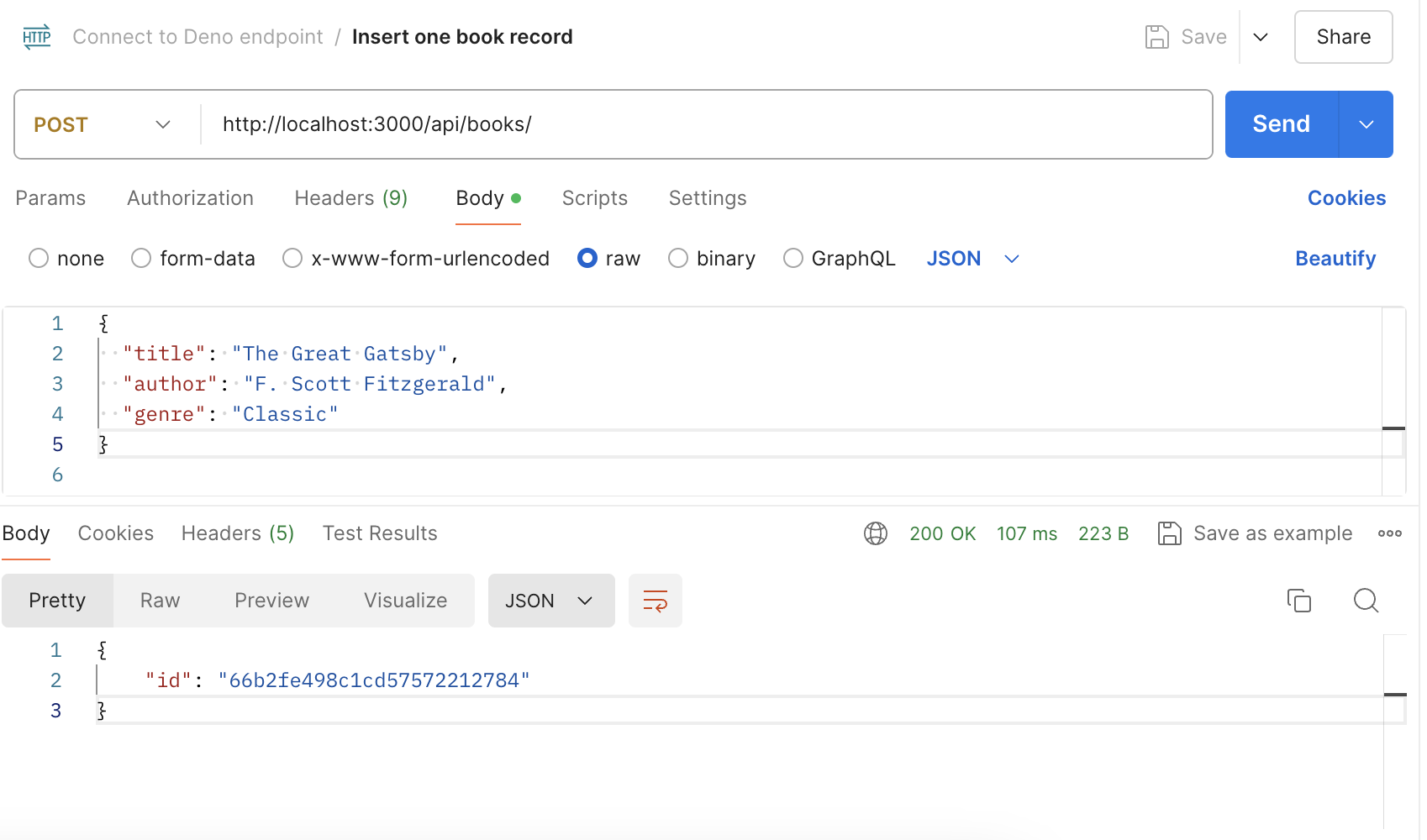
Get all the records
Next, we will make a GET request to retrieve all book records from the database.
Since there's only one record at this point, the expected response should be the data we just inserted.
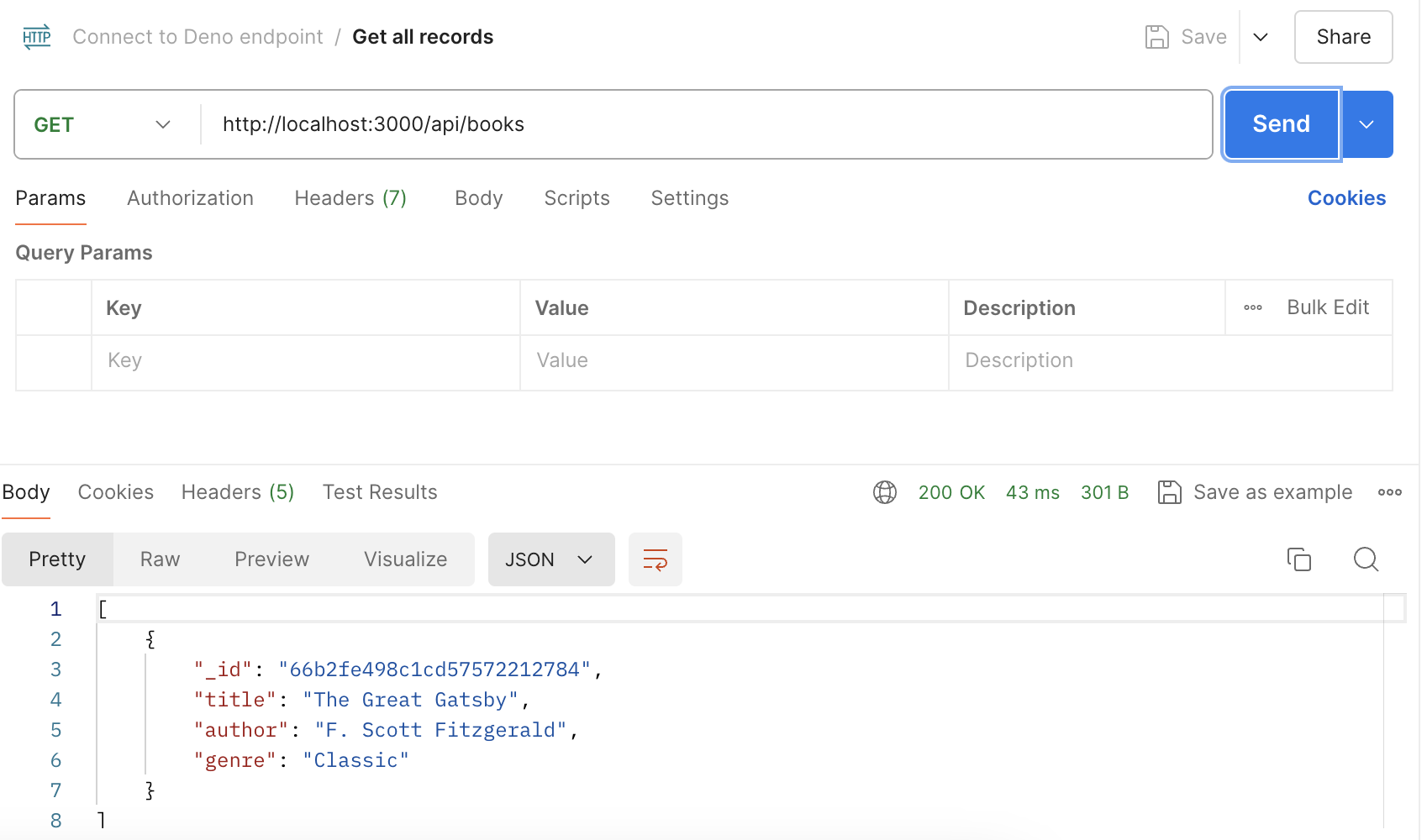
Update record by ObjectId
Since we are not working with a fixed schema or data type, we can update the genre for the data record to an array. That way, we can have it cover more than a singular genre.
We will use a PATCH request to update the genre field of the record.
{
"genre": ["tragedy", "classic"]
}
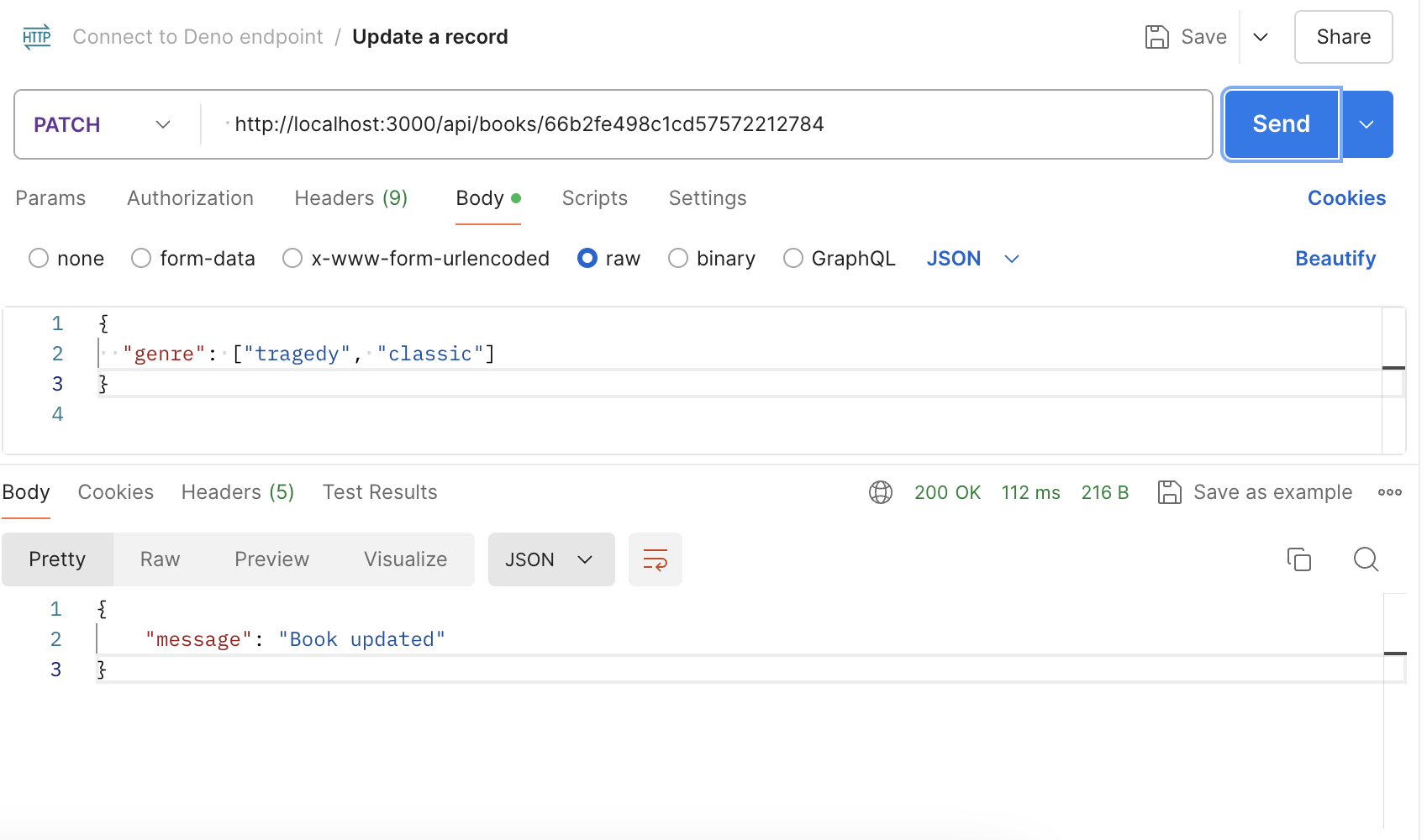
Delete record by ObjectId
Finally, we will delete the record by its ObjectId using a DELETE request.
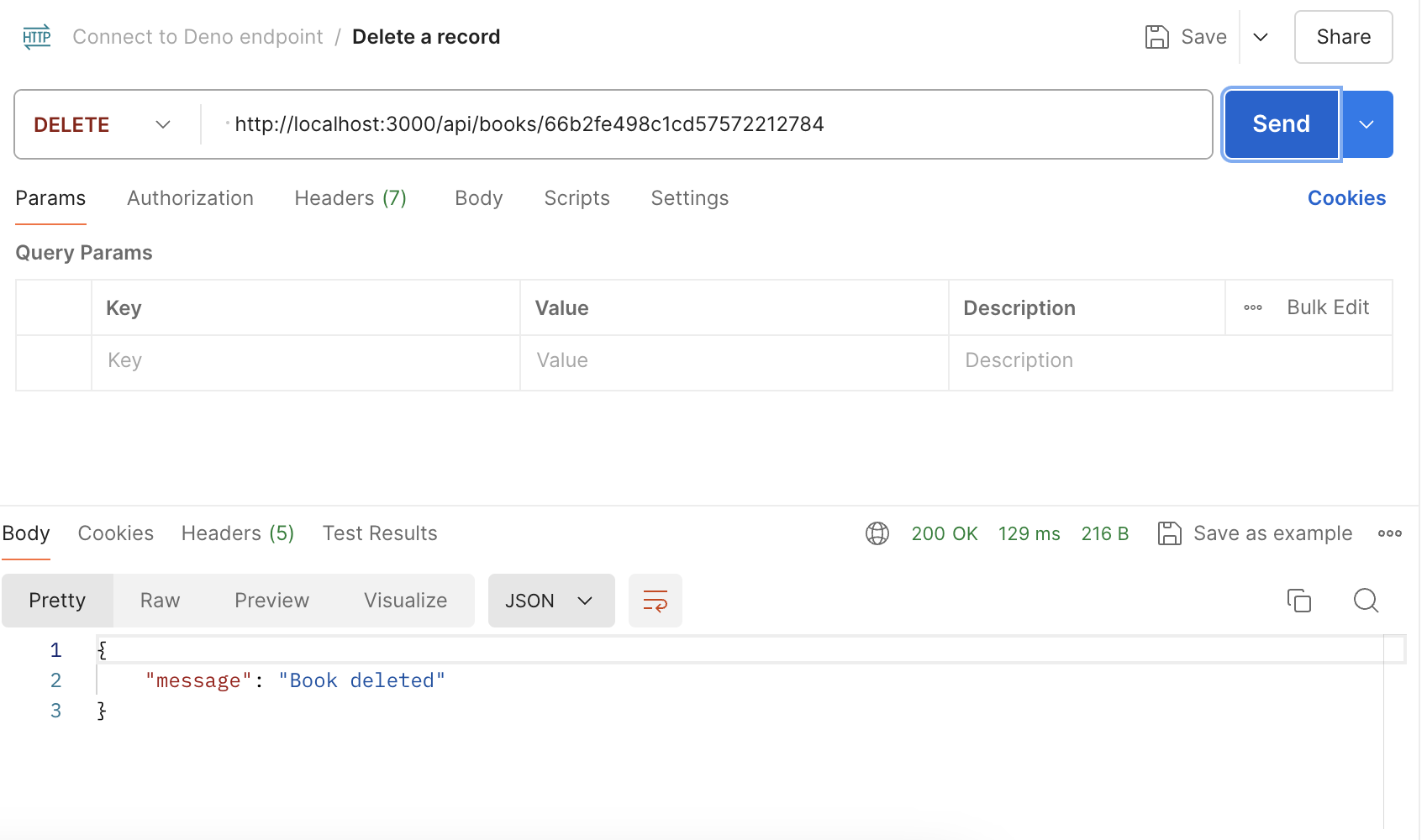
Conclusion
As we step back from this interesting setup, we've not only built a functional API but also provided an alternative approach to building web applications. Deno's built-in TypeScript support and security features offer a modern, efficient alternative for API development.
Deno, Oak and FerretDB (FORD or FOAD stack?) is a viable alternative stack for many developers to build full-stack web applications.
So if you're looking to try out new tools or enhance your existing workflow, we encourage you to experiment with Deno, Oak and FerretDB and let us know what you think.
Feel free to reach out to us on our community channels with your thoughts, feedback, and questions.
